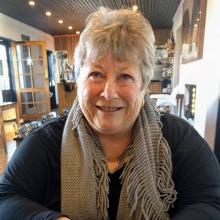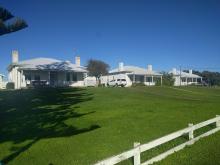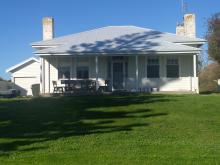
I was born in Box Hill in Victoria and was only days old when we shifted to Millicent where my Mum grew up on a farm outside the town. My Dad worked for Stratfords. He carted the limestone building blocks which they took from Mt Gambier and my Mum worked for Eudundas in Millicent—it’s now the IGA. Then we shifted here to Robe when I was a teenager, but I did go to primary school in Millicent. In my first year in primary school I was chosen to present a posy to Lady George, the Governor’s wife. I was chosen because I was the smallest in the school. It was between me and Ren DeGaris’ daughter. He was a politician. Of course there was quite a degree of disappointment when a little nobody got picked to present the posy!
My two brothers went to primary school in Robe. I went to High School in Kingston. They were the best days of my life. It was so much fun. One day the bus broke down on Mt Benson Hill. It couldn’t make it up the hill and the local bus driver was the milkman here, so he went in to town to get his milk truck to pick us up, but we were all hiding in the bushes when he came back. However, it backfired because when he couldn’t see us he gave up and went back to town and we had to walk into town. That’s quite a way. I didn’t want to leave school but then my brothers started High School and my parents couldn’t afford for three of us to go to High School so I left at sixteen.
The Robe Primary school was a fantastic place to bring up kids. My Mum started what she called a playgroup, because there were so many working mums and they didn’t know where to put their kids. It was in the RSL Hall. She had a Ford station wagon and she would collect all the kids and take them out to a farm or whatever. She made a small charge to cover books and pencils but she didn’t really make any money. She also had the Council kiosk on the foreshore for thirteen years. It ran all year, but the winters closed it down. A lot of the locals were disappointed when the Council took it away. The picture theatre used to be in the Institute so Mum would be there when the pictures finished and then she would come home and make all her own home-made pasties for the kiosk. It wasn’t until I had kids and I ran it for a little bit for her and my kids would ring up and say “when are you coming home Mum to make tea” that I realised how hard it had been for my Mum.
When my brothers started High School Mum said “Well, now you can help me with all the kids.” I must have been sixteen because I can remember the first days: when the mums would be dropping the kids off and they would be crying, and I said “Mum, I don’t want to do this.” So I worked in the office at SAFCOL down on the wharf. We would also sell the fish in the shop. When I finished there I would work at night processing the crayfish. We used to take the legs of the crayfish and sell them as spiders. That’s when you didn’t get much for your crayfish. We’d sell it locally. People use to buy a paper bagful for not very much. Crayfish wasn’t expensive back then. I think it’s very overrated.
There was a deli where we got our cold meat for sandwiches, and the Rope Hotel. The surf shop used to be a little fish shop and there was a butcher just around the corner. The hardware shop was where Ocean Bell is and our supermarket shop was where the Chinese restaurant is now. Of course we had the Institute, where the pictures were held.
Fishing was the main thing, and farming. Later on there was nothing to hold our kids here, no employment, so they had to leave and go elsewhere.
I got married when I was working at SAFCOL. My husband was from Cape Jaffa: he fished with his father down there. Then we joined the Lighthouse Service. That came about because his father did the lighthouse run. He used to take the Lighthouse Keepers and their stores out to the Lighthouse every fortnight. That was when it was on the rock out to sea. I can’t remember how many years he did that for. Graham relieved a couple of times back in the late 1960s and that’s how we got the job.
In 1970 we went to Cape Borda. That was a long way away in those days. We had to catch a bus to Adelaide and we then flew to the Island. We had a lighthouse vehicle, a four-wheel drive. When I got pregnant with our first child Graham’s great grandma wanted us to name the child Russell. She told us the story that when they discovered Kangaroo Island, seaman Russell carried the captain’s daughter ashore and he was he first person to set foot on Kangaroo Island. So she really wanted us to name our first child Russell after him. Well of course our first child was a girl, so that wasn’t going to work and at that time we didn’t give much thought to ancestry or whatever. So it didn’t happen, but now I tell my two children this story. I want them to know; now as we are getting older it means something.
We used to come into Kingscote every fortnight and our stores would come on the Troubridge from Port Adelaide. We lived in the house at the lighthouse.
If you go to Kingston now you can see the lighthouse houses on the foreshore there. The three houses are all the same and we lived in the middle one when we came back to Kingston. Cape Jaffa was different. It was on a rock. The wives and kids lived in the houses and the men would get taken out for two weeks at a time, then home for one week. I think Jaffa was a kerosene light to start with. The lights had to be turned on at a certain time.


But anyway, when we were at Cape Borda, I was flown to Adelaide to have Tracy as I was very unwell. She was born there. We came back to Cape Borda and when she was six weeks’ old we shifted to Troubridge, which is an island 6km off the mainland near Edithburgh.
At Cape Borda, Graham had built his own little boat—when you are in the lighthouse your main job is painting, so there’s time. So when we went to Troubridge we used to have a lot of divers come out there—Troubridge Shoal. Sunday nights when the divers were there our main meal was scallops. They would dive for scallops then we’d boil them up in a billy can over an open fire.
The house we lived in there was right next to the Light. There were two houses there. It was very isolated. You really didn’t spend too much time with the other people and they were too close. As I said, Tracy was only six weeks’ old. I did ‘Mothers and Babies’ by radio. The penguins would come in from fishing all day and I used to wake at night thinking my baby was crying but it was the baby penguins nesting under the house. They sounded like real babies. I think you can still go out and see them there now at a holiday place.
We used to come into Edithburgh only on a really flat, calm night. Seeing we had our own boat I went in once or twice to the mainland for a counter meal. My husband played footy for Edithburgh and the team would bring him back to catch the boat back to the Light. They would flash their lights to let me know he was on his way home and then when he landed, we then would flash our headlights to let them know he’d landed and they’d all drive off. Our stores would come out by fishing boat, and normally that’s how we would go to the mainland, on the fishing boat.
When we left Troubridge my husband sold that boat he’d built for our first car. We finally had a car. We came back to Kingston. We were at Cape Jaffa from 1969 to 1970, and then back in 1973. We were in Cape Borda from 1970 to ’71. 1972 to 1973 in Troubridge and then came back to Cape Northumberland 1973-76, which is Port MacDonnell.
From Cape Borda it was a long way for to go into the doctor in Kingscote. I remember Graham taking me into the doctor who said to him “if Jenny goes into labour, just remember to have plenty of newspaper and a shoelace”. Graham said “What’s that for?” and the doctor said “the shoelace is for tying the cord and the newspaper is sterile”. That really put the wind up Graham and he took me in a month before Tracy was due and I boarded with people I didn’t even know. It was tough. Back then the Murphy’s had the Ozone Hotel at Kingscote and that’s where you joined the ambulance and so he went down to join the ambulance but drank the money and didn’t join. So then I got flown to Adelaide, but because the baby was so sick, we never got a bill.
The wildlife at Cape Borda was beautiful. They were doing quite a bit of building there and the timber that was brought over was wrapped up in cardboard, and the kangaroos used to eat it. Graham would do weather reports there, that was a big job. There were lots of snakes everywhere. I always remember the head keeper there gave me a little duck. He said this is the only one that survived—the snakes got the rest. It will die if we leave it out--did I want it? This little duck used to follow me all around the house and I thought I’ll let it go for a swim in the bath because we had to be very careful of our water over there. Bath water, toilet and washing water we had to take from a dam. So I let this little duck go for a swim in the bath, but I didn’t know back then that ducks had to dry their webbed feet on the ground, so his webbed feet closed up and he couldn’t walk. So I had him in a box next to the slow combustion stove. He died. I learned a lesson from that. Poor little thing.
We shifted to Darwin in 2000 and we stayed for five years. That was after lighthouse closed in Cape Northumberland. We came back here to Robe and my husband went cray-fishing in his father’s boat. His father had a fish factory in Cape Jaffa: he bought crayfish. We had two kids by then. My son was born in Mount Gambier. He was born just after we left the lighthouse in Cape Northumberland. My husband fished for a while down there and my daughter started school in Allendale and then we shifted back here. Graham fished with another fellow for a while and then we took over the boat. We lived here In Robe in one of those flats where the hardware shop is. Both the kids went to school in Robe and then on to Kingston. Graham used to fish the fishing season. Back then the seasons used to close themselves and you didn’t get the money you get now. He used to go and work away every winter. He’d find work up at Port Broughton and a couple of times he went to Melbourne to work for TNT. In Port Broughton he worked at crabbing. Both my kids went to Mount Gambier and did a trade. Tracy did hairdressing and Adam did plumbing.
My daughter has now shifted back to Adelaide—she was on the Gold Coast. So I have a grand-daughter here, Adam’s child and a grandson in Adelaide. Adam and his father went to East Timor for a while after the rebellion. They cleaned up over there. Adam wasn’t very old so he has seen a lot of things. Adam came back before his father. His father worked with a company that transferred him to Darwin so I went up and we bought a property at Humpty Doo and so I was up there for five years. Graham always said we’d do it for five years and then come home. I wanted to come home then. I did like the lifestyle there and you do get used to the weather but things didn’t work out for us up there. I came back in 2005.
I came back and I was not in a good place. My first cousin, who is Kasey Chambers’ mum, said “Right, get up, you’re coming on the road with us.” So I went on the road with Kasey and looked after her kids. She was well known down here, and back then she was the girl in the Dead Ringer Band—Mum and Dad, her brother, and Kasey. Then she became a big star. They lived at Copacabana, which is between Sydney and Newcastle. It’s a little coastal town so it’s very similar to what they were used to. Then the Dead Ringer Band split up and Kasey went out on her own and that’s when she became a lot better known. Then she went to the States and I wasn’t happy with her because she took her mum and not me!
It was really good for me although it was hard work. The first tour I had Talon, her eldest son, by himself, and that was great because I spent a lot of time in the Green Room at the side of the stage. The next tour I had three kids, her brother’s child Eden, one of her father’s children, and Jake and Talon. We would be up early in the mornings to drive to the next venue. Usually we would have to be there by four o’clock in time to do sound checks. Di would set all the merchandise out and then I would take the kids back for tea and put them to bed. For the third tour I just had Kasey’s youngest son Arlo. She had all her kids in a very good routine. She would cook all their vegies on a gas stove. She had Arlo in bed by seven o’clock, dead quiet. I would have the tele on mute.
Then my mum got cancer and so I came back here and spent a lot of time in Millicent with her until she died. I’m still here with my son and granddaughter. Robe brings everyone back.
It has got to grow. I can remember years ago years ago Steve Woolston said “Jenny, Robe will be a mini Torquay” and that is exactly how it is going. We can’t stop progress. Back then we could go to the hotel and have a few drinks and not worry about driving home. We could do a lot more than you can do now, but that’s the same everywhere. So life changes.
At Christmas you don’t see many locals around. They just do their shopping early in the morning and go home. It is only for six weeks of the year, but it is getting longer. I can remember, I came back here to work, because I worked at the Robe Hotel for over 20 years, cleaning and waitressing when my husband was fishing. Easter would come and go and then the town would be dead as. Maybe August would be our quietest month now. But have a look, how many dress shops have we got now. How they survive the quiet times I don’t know.
Victorians have always loved Robe and have been coming back for years. When we were kids we’d have holidaymakers from Horsham – well, now a lot of those people own proper homes here and come back. I feel that Adelaide is only just realising and discovering Robe. It is only three and a half hours drive from Adelaide but before they would always go to Victor Harbour. Now they are finding out we are not that far away.
Back then we wouldn’t have known the road would get this busy. It is terrible that you can’t get a park in the street. Who would have thought that we would have stop lights! But these stop lights have been a godsend, because at least when you get stuck on Robe Street down at the corner there you get a break in the traffic when the lights go green. I did hear of maybe making it one-way street. Well, they’ve got to do something.